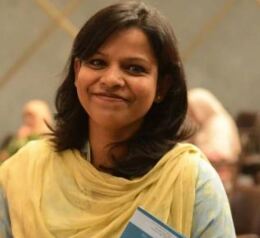INTERNATIONAL WOMEN'S FORUM
THEME: "Breaking Barriers, Shaping the Future of Women"
 17-18 Mar 2025
17-18 Mar 2025  Amsterdam, Netherlands
Amsterdam, Netherlands THEME: "Breaking Barriers, Shaping the Future of Women"
 17-18 Mar 2025
17-18 Mar 2025  Amsterdam, Netherlands
Amsterdam, Netherlands 
CARE USA, United Kingdom
Title: Unveiling the Gender Gap in Nutrition: A formative study of sociocultural barriers in Southeast and West Africa
Nazneen is a Senior Technical Adviser at CARE USA. As a Technical Lead-Nutrition, she is providing technical leadership and support to CASCADE, a multi-country, multi-sectoral project implemented in six African countries. Before joining CARE USA, while at CARE Bangladesh (2017-2022), Nazneen, as Senior Team Leader, led multiple nutrition advocacy projects and achieved several advocacy wins with the national government to strengthen the multisectoral approach to nutrition into the Second National Nutrition Action Plan (NPAN2). She worked with BRAC for 9 years (2008-2016), performed as a Senior Sector Specialist and Divisional Manager, and led multiple initiatives successfully. She was elected twice and represented as Co-Chair of CSA for SUN from 2019 to 2022). Nazneen is a Public Health Professional with 20 years of working experience with an academic background, an M.Sc. in Food and Nutrition Science and two Master of Public Health (MPH) majors in Epidemiology& Research and Reproductive and Maternal Health and Nutrition
Abstract should give clear indication of the objectives, scope, results, methods used, and conclusion of your work. One figure and one table can be included in your results and discussions.
Background: Gender inequalities and gender norms restrict women’s access to resources and services, such as land, knowledge, and food, leading to poverty and food and nutrition insecurity1. Gender issues are multivariate and acute in Southeast and West African settings. Cultural and social norms often dictate that women and girls eat last and least. We conducted formative studies on how gender inequality affects women’s access to and consumption of healthy diets under the CASCADE project. CASCADE, a consortium of CARE and GAIN funded by the Ministry of Foreign Affairs, Netherlands, aims to strengthen nutrition policy implementation in six African countries – Nigeria, Benin, Ethiopia, Uganda, Mozambique, Kenya - from 2022-26.
Objectives of the study: To understand social and cultural norms that affect gender inequalities as they affect access to and consumption of healthy diets, especially among women and children in six African countries, and guide the development of gender-transformative interventions for the CASCADE project.
Methodology: The studies were conducted using both quantitative and qualitative methods. The research team shared findings from a desk review of country-specific reports to facilitate the interpretation of gender-related data to improve nutrition.
Result and discussion: Cultural restrictions and taboos significantly limit women's access to protein and vitamin-rich animal-source foods across several African countries. Pregnant and lactating women face additional dietary prohibitions, particularly concerning animal-specific parts and sizes. In Nigeria, the findings reveal that the root causes like ignorance (60.13%), cultural norms (59.57%), and religious beliefs (46.26%) perpetuate gender inequalities. Practices in Kenya and Uganda prioritize men and boys in food allocation, with misconceptions about foods like fruits and animal intestines affecting women and children. In Ethiopia, household spending prioritizes coffee and salt over nutritious foods.
Conclusion: Across these countries, cultural norms, beliefs, and social inequalities play significant roles in limiting women's and children's access to nutritious food, perpetuating gender-based nutritional disparities. Efforts to address these challenges must include culturally sensitive SBC-oriented interventions.